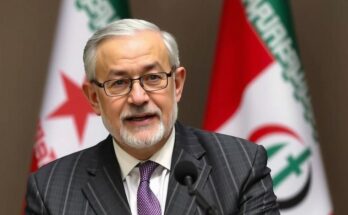Sudan’s civil war, which reignited with a major offensive by the SAF against the RSF on September 26, has resulted in over 20,000 deaths and more than 10.8 million displaced persons. Despite extensive efforts for ceasefires and peace talks, the conflict persists with significant humanitarian consequences, rising ethnic tensions, and insufficient international intervention. The involvement of external actors complicates the war dynamics, making resolution elusive.
On September 26, the Sudanese Armed Forces (SAF) intensified their operations against the paramilitary Rapid Support Forces (RSF) in key regions such as Khartoum and Bahri, reigniting a civil war that had somewhat subsided for several months. Eighteen months into this devastating conflict, the United Nations reports a staggering death toll exceeding 20,000 individuals, while the International Organization for Migration estimates over 10.8 million internally displaced persons (IDPs) as of October 1. Attempts at ceasefire and peace negotiations have repeatedly faltered, coinciding with the recent military offensives ahead of U.S.-led ceasefire discussions during the UN General Assembly.
The civil war in Sudan has evolved into a violent struggle primarily between two factions: the Sudanese Armed Forces (SAF) and the Rapid Support Forces (RSF). This conflict originally stemmed from a power struggle between their leaders, Abdel Fattah al-Burhan of the SAF and Hamdan Dagalo of the RSF. What initially began in Khartoum has spread across various regions, including Omdurman, Bahri, Port Sudan, El Fasher, as well as throughout the Darfur and Kordofan states. This multifaceted conflict has been exacerbated by humanitarian crises, including widespread famine and violence, particularly targeting non-Arab communities by the RSF and its allied militias.
The prolonged nature of the civil war in Sudan reflects deep-rooted power struggles among key military factions, exacerbated by external influences and ongoing humanitarian crises. Numerous attempts at achieving a ceasefire have proven ineffective, with both parties remaining entrenched in their positions. The potential for negotiated peace appears dim, as international attention wanes in favor of other global conflicts. The Sudanese populace continues to suffer amid escalating violence, raising concerns about the war’s long-term implications for national integrity and stability.
Original Source: www.thehindu.com




